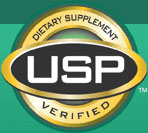Supplements - Choose Wisely!
(Part 2 of 2)
In my last article, I gave you a peek into the world of supplements. I told you that the United States government does not do three very important things to protect you.
1. The U.S. government does NOT test supplements to prove they work.
2. The U.S. government does NOT test supplements to make sure they contain the ingredients listed on the label.
3. The U.S. government does NOT test supplements for safety.
It's up to you to trust the manufacturers. But you can do more. There are now organizations that test the quality of supplements. There are three major certifications or "seals-of-approval" you can look for.
 NSF International - http://www.nsf.org/
NSF International - http://www.nsf.org/
 U.S. Pharmacopeia - https://www.quality-supplements.org/
U.S. Pharmacopeia - https://www.quality-supplements.org/
 Consumerlab.com - http://www.consumerlab.com
Consumerlab.com - http://www.consumerlab.com
These three organizations test to make sure that certified supplements actually contain the ingredients on the label and that they don't contain contaminants.
Looking for the certified mark is an important first step, but you should know that the seals do not indicate a particular supplement is either safe or effective. Safety and efficacy are still primarily left up to the manufacturer.
To protect yourself, the following is a list of 12 supplements that are so dangerous they should not be on the market. These supplements have been called the "Dirty Dozen" by Consumer Reports because they may cause cancer, severe liver or kidney damage, heart problems and in some cases even death.
If you are taking any of these supplements without a doctor's prescription, you are putting your health (and possibly your life) at risk. Here's the list.
Definitely Hazardous
(This has caused documented human cancer
and is linked to kidney failure.)
Aristolochic acid (Aristolochia, birthwort, snakeroot, snakeweed, sangree root, sangrel, serpentary, asarum canadense, wild ginger)
(This can cause nausea, vomiting, low blood pressure, respiratory system paralysis, heart-rhythm disorders and even death.)
Aconite (Aconit, Aconiti Tuber, Acónito, Aconitum, Aconitum Angustifolium, Aconitum napellus, Aconitum carmichaeli, Aconitum kusnezoffi, Atis, Ativisha, Autumn Monkshood, Bachnag, Bikhma, Blue Monkshood Root, Caowu, Chuanwu, Chuan-wu, Fu Zi, Futzu, Helmet Flower, Monkshood, Monkshood Tuber, Prativisha, Radix Aconiti, Radix Aconiti Kusnezoffii, Radix Aconiti Lateralis Preparata, Vachnag, Vatsnabh, Visha, Wild Aconitum, Wolfsbane, Wutou.)
Very Likely Hazardous
(These are banned in other countries, have an
FDA warning or show adverse effects in studies.)
- Comfrey (symphytum officinale, ass ear, black root, blackwort, bruisewort, consolidae radix, consound, gum plant, healing herb, knitback, knitbone, salsify, slippery root, symphytum radix, wallwort)
- Androstenedione (4-androstene-3, 17-dione, andro, androstene)
- Chaparral (Larrea divaricata, creosote bush, greasewood, hediondilla, jarilla, larreastat)
- Germander (teucrium chamaedrys, wall germander, wild germander)
- Kava (Piper methysticum, ava, awa, gea, gi, intoxicating pepper, kao, kavain, kawa-pfeffer, kew, long pepper, malohu, maluk, meruk, milik, rauschpfeffer, sakau, tonga, wurzelstock, yagona, yangona)
Likely Hazardous
(These have adverse-event reports or theoretical risks.)
- Bitter orange (Citrus aurantium, green orange, kijitsu, neroli oil, Seville orange, shangzhou zhiqiao, sour orange, zhi oiao, zhi xhi)
- Organ/glandular extracts (brain/adrenal/pituitary/plancenta/other gland "substance" or "concentrate")
- Lobelia (Lobelia inflata, asthma weed, bladderpod, emetic herb, gagroot, lobelie, Indian tobacco, pukeweed, vomit wort, wild tobacco)
- Pennyroyal oil (hedeoma pulegioides, lurk-in-the-ditch, mosquito plant, piliolerial, pudding grass, pulegium, run-by-the-ground, squaw balm, squawmint, stinking balm, tickweed)
- Scullcap (Scutellaria lateriflora, blue pimpernel, helmet flower, hoodwort, mad weed, mad-dog herb, mad-dog weed, quaker bonnet, scutelluria skullcap)
- Yohimbe (Pausinystalia yohimbe, johimbi, yohimbehe, yohimbine)
It is important that you tell your doctor about any supplements you may be taking, not only because of the possible side effects, but many supplements can interfere with the effectiveness of prescribed medications.
(By the way, this list was provided and compiled by Consumer Reports. If you don't subscribe to the magazine, you can subscribe online. For potentially life-saving reports like this, I highly recommend it! Click Here to visit Consumer Reports.)
UPDATE: 15 Supplements to Always Avoid
Consumer Reports has released an updated list, which now includes "15 Supplements to Always Avoid." It's VERY important and free for anyone to read. If you're considering buying a supplement, you need to make sure these are NOT on the label.
Part 1 2
Call for a FREE Consultation (305) 296-3434
CAUTION: Check with your doctor before
beginning any diet or exercise program.
11/11/2004
Updated 5/27/2015
Updated 7/28/2016



